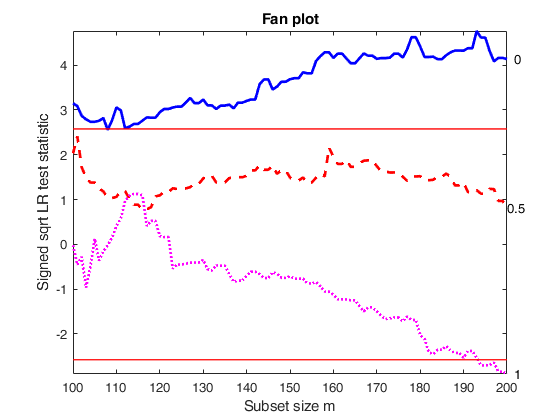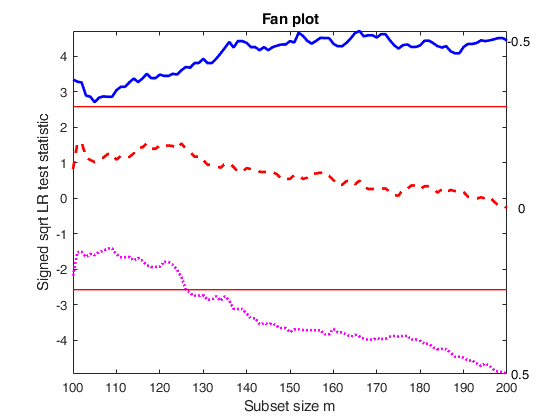FSRfanCens
FSRfanCens monitors the values of the signed sqrt LR test for each lambda in the tobit model
Description
Examples
 FSRfanCens with simulated data.
FSRfanCens with simulated data.
 FSRfanCens with simulated data.
FSRfanCens with simulated data.Generate Tobit regression data
rng('default')
rng(200)
n=200;
lambda=0.5;
p=3;
sigma=0.5;
beta=ones(p,1);
X=randn(n,p)+1;
epsilon=randn(n,1);
y=X*beta+sigma*epsilon;
y=normYJ(y,1,lambda,'inverse',true,'Jacobian',true);
qq=quantile(y,0.3);
y(y<=qq)=qq;
left=min(y);
% Compute fanplot for 3 values of lambda
[out]=FSRfanCens(y,X,'left',left,'la',[0 0.5 1],'init',round(n*0.5));
Total estimated time to complete LMS: 0.01 seconds Total estimated time to complete LMS: 0.01 seconds Warning: interchange greater than 10 when m=100 Total estimated time to complete LMS: 0.01 seconds

 Double censored simulated data.
Double censored simulated data.
 Double censored simulated data.
Double censored simulated data.
rng('default')
rng(4)
n=200;
lambda=0;
p=3;
sigma=0.5;
beta=1*ones(p,1);
X=randn(n,p)+1;
epsilon=randn(n,1);
y=X*beta+sigma*epsilon;
y=normYJ(y,1,lambda,'inverse',true);
% Create left censored observations
qq=quantile(y,0.3);
y(y<=qq)=qq;
% Create right censored observations
qq=quantile(y,0.9);
y(y>=qq)=qq;
% Specify the values of the transformation parameter
la=[-0.5 0 0.5];
left=min(y);
right=max(y);
% Call FSRfanCens and produce the fanplot
[out]=FSRfanCens(y,X,'left',left,'right',right,'la',la,'init',round(n*0.5));
Total estimated time to complete LMS: 0.01 seconds Total estimated time to complete LMS: 0.01 seconds Total estimated time to complete LMS: 0.01 seconds Warning: interchange greater than 10 when m=100

Related Examples
Input Arguments
y — Response variable.
Vector.
A vector with n elements that contains the response variable. It can be either a row or a column vector.
Data Types: single| double
X — Predictor variables.
Matrix.
Data matrix of explanatory variables (also called 'regressors') of dimension (n x p-1). Rows of X represent observations, and columns represent variables. Missing values (NaN's) and infinite values (Inf's) are allowed, since observations (rows) with missing or infinite values will automatically be excluded from the computations. NOTICE THAT THE INTERCEPT MUST ALWAYS BE INCLUDED.
Data Types: single| double
Name-Value Pair Arguments
Specify optional comma-separated pairs of Name,Value arguments.
Name is the argument name and Value
is the corresponding value. Name must appear
inside single quotes (' ').
You can specify several name and value pair arguments in any order as
Name1,Value1,...,NameN,ValueN.
'balancedSearch',false
, 'family','YJ'
, 'init',100 starts monitoring from step m=100
, 'intercept',false
, 'la',[-1 -0.5]
, 'left',1
, 'lms',0
, 'msg',false
, 'nocheck',true
, 'right',800
, 'nsamp',1000
, 'plots',1
, 'conflev',[0.9 0.95 0.99]
, 'FontSize',20
, 'labx','my labx'
, 'laby','my laby'
, 'lwd',5
, 'lwdenv',5
, 'SizeAxesNum',12
, 'titl','my title'
, 'xlimx',[0 1]
, 'ylimy',[0 1]
balancedSearch
—Balanced search.scalar logical.
If Balanced search the proportion of observations in the subsets equals (as much as possible) the proportion of units in the sample. The default value of balancedSearch is true.
Example: 'balancedSearch',false
Data Types: logical
family
—string which identifies the family of transformations which
must be used.character.
Possible values are 'BoxCox' or 'YJ' (default) The Box-Cox family of power transformations equals for \lambda not equal to zero, and \log(y) if \lambda = 0.
The Yeo-Johnson (YJ) transformation is the Box-Cox transformation of y+1 for nonnegative values, and of |y|+1 with parameter 2-\lambda for y negative.
Remember that BoxCox can be used just if input left is positive. Yeo-Johnson family of transformations does not have this limitation.
Example: 'family','YJ'
Data Types: char
init
—Search initialization.scalar.
It specifies the initial subset size to start monitoring the value of the score test, if init is not specified it will be set equal to: p+1, if the sample size is smaller than 40;
min(3*p+1,floor(0.5*(n+p+1))), otherwise.
Example: 'init',100 starts monitoring from step m=100
Data Types: double
intercept
—Indicator for constant term.true (default) | false.
Indicator for the constant term (intercept) in the fit, specified as the comma-separated pair consisting of 'Intercept' and either true to include or false to remove the constant term from the model.
Example: 'intercept',false
Data Types: boolean
la
—values of the transformation parameter for which it is
necessary to compute the LR test.vector.
Default value of lambda is la=[-1 -0.5 0 0.5 1]; that is the five most common values of lambda
Example: 'la',[-1 -0.5]
Data Types: double
left
—left limit for the censored dependent variable.scalar.
If set to -Inf, the dependent variable is assumed to be not left-censored; default value of left is zero (classical Tobit model).
Example: 'left',1
Data Types: double
lms
—Criterion to use to find the initial
subset to initialize the search.scalar.
If lms=1 (default) Least Median of Squares is computed, else Least Trimmed Squares is computed.
Example: 'lms',0
Data Types: double
msg
—Level of output to display.boolean.
Boolean scalar which controls whether to display or not messages on the screen.
If msg==true (default) messages are displayed on the screen about estimated time to compute the LMS (LTS) for each value of lambda else no message is displayed on the screen
Example: 'msg',false
Data Types: logical
nocheck
—Check input arguments.boolean.
If nocheck is equal to true no check is performed on matrix y and matrix X. Notice that y and X are left unchanged. In other words the additional column of ones for the intercept is not added. As default nocheck=false.
Example: 'nocheck',true
Data Types: boolean
right
—right limit for the censored dependent variable.scalar.
If set to Inf, the dependent variable is assumed to be not right-censored; default value of left is Inf (classical Tobit model).
Example: 'right',800
Data Types: double
nsamp
—Number of subsamples which will be extracted to find
the initiasl robust estimator.scalar.
If nsamp=0 all subsets will be extracted. They will be (n choose p). Remark: if the number of all possible subset is <1000, the default is to extract all subsets otherwise just 1000. If nsamp is a matrix of size r-by-p, it contains in the rows the subsets which sill have to be extracted. For example, if p=3 and nsamp=[ 2 4 9; 23 45 49; 90 34 1]; the first subset is made up of units [2 4 9], the second subset of units [23 45 49] and the third subset of units [90 34 1];
Example: 'nsamp',1000
Data Types: double
plots
—Plot on the screen.scalar.
If plots=1 the fan plot is produced else (default) no plot is produced.
REMARK: all the following options work only if plots=1
Example: 'plots',1
Data Types: double
conflev
—Confidence level.scalar | vector.
Confidence level for the bands (default is 0.99, that is we plot two horizontal lines in correspondence of value -2.58 and 2.58).
Example: 'conflev',[0.9 0.95 0.99]
Data Types: double
FontSize
—font size of the labels of the axes.scalar.
Default value is 12.
Example: 'FontSize',20
Data Types: double
labx
—a label for the x-axis.character.
default: 'Subset size m'
Example: 'labx','my labx'
Data Types: char
laby
—a label for the y-axis.character.
default:'Score test statistic'
Example: 'laby','my laby'
Data Types: char
lwd
—linewidth of the curves which
contain the score test.scalar.
Default line width=2.
Example: 'lwd',5
Data Types: double
lwdenv
—width of the lines associated
with the envelopes.scalar.
Default is lwdenv=1.
Example: 'lwdenv',5
Data Types: double
SizeAxesNum
—Scalar which controls the size of the numbers of the
axes.scalar.
Default value is 10.
Example: 'SizeAxesNum',12
Data Types: double
tag
—handle of the plot which is about to be created.character.
The default is to use tag 'pl_fan'. Notice that if the program finds a plot which has a tag equal to the one specified by the user, then the output of the new plot overwrites the existing one in the same window else a new window is created
Example:
'tag','mytag'
Data Types: char
titl
—a label for the title.character.
default: 'Fan plot'
Example: 'titl','my title'
Data Types: char
xlimx
—Minimum and maximum of the x axis.vector.
Default value is [init n]
Example: 'xlimx',[0 1]
Data Types: double
ylimy
—Minimum and maximum of the y axis.vector.
Default value for ylimy(1)=max(min(score_test),-20).
Default value for ylimy(2)=min(max(score_test),20).
Example: 'ylimy',[0 1]
Data Types: double
Output Arguments
out — description
Structure
Structure which contains the following fields
| Value | Description |
|---|---|
Score |
(n-init+1) x length(la)+1 matrix containing the values of the signed sqrt LR test for each value of the transformation parameter: 1st col = fwd search index; 2nd col = value of the signed sqrt LR test in each step of the fwd search for la(1); ........... end col = value of the signed sqrt LR test test in each step of the fwd search for la(end). |
Exflag |
(n-init+1) x *length(la)+1 matrix containing the reason fminunc stopped in the maximization of the unconstrained likelihood. Matrix of integers. Column 2 is associated with the search which has ordered the data using la(1); ......... Column *length(la)+1 is associated with the search which has ordered the data using la(length(la)). |
laMLE |
(n-init+1) x *length(la)+1 matrix containing the values of the maximum likelihood estimate of lambda. Column 2 is associated with the search which has ordered the data using la(1); ......... Column *length(la)+1 is associated with the search which has ordered the data using la(length(la)). |
la |
vector containing the values of lambda for which fan plot is constructed |
bs |
matrix of size p x length(la) containing the units forming the initial subset for each value of lambda |
Un |
cell of size length(la). out.Un{i} is a n-init) x 11 matrix which contains the unit(s) included in the subset at each step in the search associated with la(i). REMARK: in every step the new subset is compared with the old subset. Un contains the unit(s) present in the new subset but not in the old one. Un(1,:), for example, contains the unit included in step init+1 ... ; Un(end,2) contains the units included in the final step of the search |
y |
A vector with n elements that contains the response variable which has been used |
X |
Data matrix of explanatory variables which has been used (it also contains the column of ones if input option intercept was missing or equal to 1) |
class |
'FSRfanCens'. |
References
See Also
regressCensTra
|
regressCens
|
FSRfan
|
Score
|
ScoreYJ
|
ScoreYJpn
|
fanBIC
|
fanBICpn